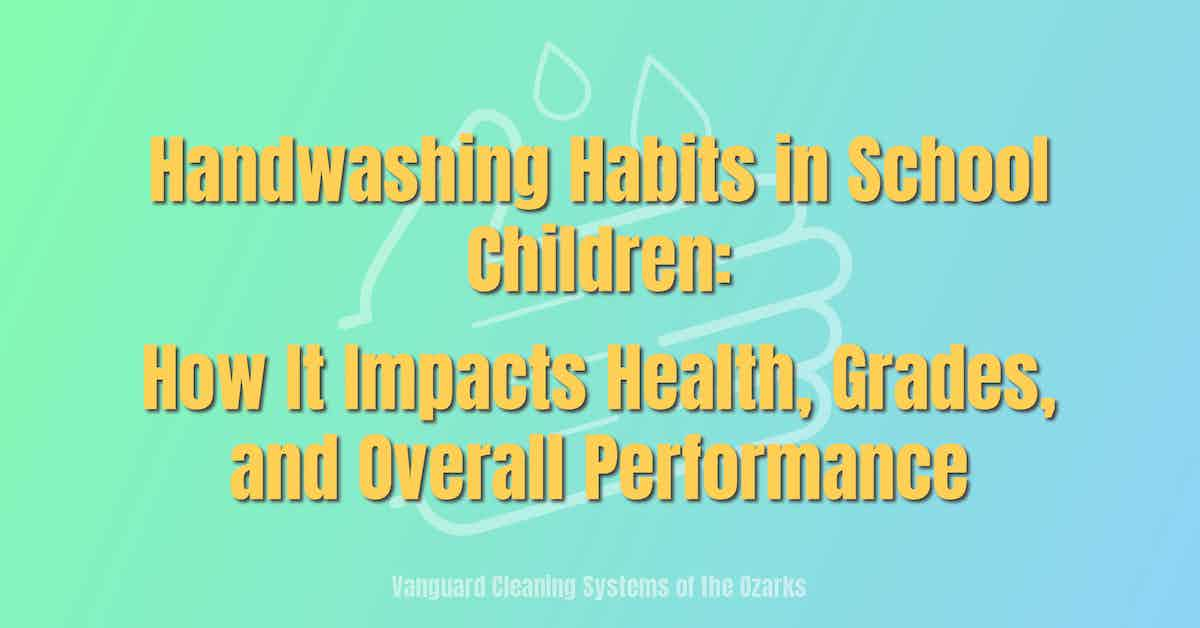Good hand hygiene in schools is crucial for maintaining occupant health, preventing the spread of illnesses, reducing absenteeism, and positively impacting student behavior, socialization, and academic performance.

Handwashing in Schools
Handwashing with soap and water is crucial for maintaining good health and preventing the spread of illnesses in the classroom.
Poor hand hygiene can lead to infectious disease transmission, increased absenteeism, and a significantly reduced probability of graduating high school.
Promoting and practicing proper handwashing ensures students are less likely to contract and spread illnesses, leading to fewer missed school days and improved academic achievement.
In addition, good hand hygiene can also positively impact student behavior and socialization, contributing to overall school performance and success.
However, according to data from the latest Health Handwashing Survey, many parents are concerned about the quality of hand hygiene in the classroom.
Handwashing Habits in School Children
According to the Bradley Corporation;
- 50% of parents with children in K-12 schools are skeptical about their child's handwashing habits while at school.
- 44% of surveyed parents believe that schools must do more to encourage good handwashing habits.
- 56% of parents said they would be more likely to support a school that had a strong hand hygiene program.
- 87% of parents surveyed believe that their child's hand hygiene habits have improved since the start of the COVID-19 pandemic.
- 59% of parents surveyed have talked to their children about proper hand hygiene, and 52% have provided their children with hand sanitizer for use at school.
Common factors that negatively influence student handwashing behavior at school include:
- Lack of access to clean and well-maintained handwashing facilities.
- Limited time between classes or activities.
- Peer pressure or social norms.
- A belief that handwashing is unnecessary or ineffective.
- Lack of knowledge about proper handwashing techniques, and;
- Forgetfulness or negligence.
The Impact of Handwashing on Student Health and Performance
Research has shown that hand hygiene education and promotion in schools can reduce illness-related absenteeism among students.
In one study, schools implementing a hand hygiene program saw a 51% reduction in absenteeism due to gastrointestinal illnesses.
According to Education World;
A study of 305 Detroit children found that youngsters who washed their hands four times a day had 24 percent fewer sick days due to respiratory illness and 51 percent fewer days lost because of stomach upset.
A study of 290 students in 5 schools (two in Ohio and one each in Delaware, Tennessee, and California) revealed that handwashing education and the use of hand sanitizer resulted in 51 percent less absenteeism.
Additional studies show that consistent classroom attendance is critical to long-term outcomes.
Students who are chronically absent due to illness can fall behind on coursework, leading to lower grades and decreased academic achievement.
Poor health is one of the main causes of chronic absenteeism (missing 15+ days of school) among students.
The U.S. Department of Education calls chronic absenteeism “a hidden educational crisis” that leads not only to higher dropout rates, but also poorer outcomes later in life.
In the 2015-2016 school year, about 1 in 6 children was chronically absent.
In addition to educational benefits, good hand hygiene can promote long-term health benefits for students.
For example, by reducing the spread of infectious diseases in schools, students are less likely to develop chronic illnesses, such as asthma or allergies, which can harm overall health and well-being.
According to the Washington State Department of Health;
Many studies cited on the U.S. Centers for Disease Control and Prevention (CDC) website have shown that handwashing education and access to soap in schools can help improve attendance. Handwashing education in the community:
Reduces the number of people who get sick with diarrhea by 23-40%.
Reduces diarrheal illness in people with weakened immune systems by 58%.
Reduces respiratory illnesses, like colds, in the general population by 16-21%.
Reduces absenteeism due to gastrointestinal illness in schoolchildren by 29-57%.
Best Practices for Encouraging Good Hand Hygiene in Schools
- Providing access to handwashing facilities: Schools should ensure that handwashing facilities are available, clean, and well-maintained. Soap and water should be readily available in all restrooms, and hand sanitizer should be available in common areas.
- Educating students on proper hand hygiene techniques: Schools should provide information on how to wash their hands and use hand sanitizer properly. This can be done through posters, classroom instruction, and educational materials.
- Encouraging regular handwashing: Teachers and staff should encourage students to wash their hands regularly throughout the day, especially before eating and after using the restroom.
- Making handwashing fun: Schools can make handwashing more fun and engaging for students by incorporating songs or games that encourage proper hand hygiene.
- Modeling good hand hygiene behavior: Teachers and staff should model good hand hygiene behavior for students by washing their hands regularly and using hand sanitizer when necessary.
- Providing incentives for good hand hygiene: Schools can incentivize good hand hygiene by offering rewards or recognition to students who consistently practice proper hand hygiene.
Enhanced Cleaning and Disinfection Strategies
Enhanced cleaning and targeted disinfection strategies are essential for addressing low handwashing rates in school children.
By maintaining a clean and hygienic environment, schools can help reduce the transmission of infectious diseases and encourage students to practice good hand hygiene.
Best practices include:
- Regular cleaning and disinfection of high-touch surfaces, such as doorknobs, desks, and computer keyboards, can help reduce the spread of germs and bacteria.
- Providing hand sanitizer stations throughout the school can make it easier for students to practice good hand hygiene, especially when soap and water are not readily available.
- Using signage and visual aids, such as posters and restroom reminders, can help reinforce the importance of handwashing and encourage students to practice proper hand hygiene.
- Educating students about proper hand hygiene techniques can reinforce the importance of handwashing and reduce the spread of illness.
References & Resources
Takeaway
Maintaining good hand hygiene in schools is crucial in preventing the spread of illnesses and promoting overall health and academic achievement.
However, many parents are concerned about the quality of hand hygiene in the classroom.
Encouraging proper handwashing practices, providing access to handwashing facilities, educating students on appropriate techniques, and incentivizing good hand hygiene are among the best practices for schools.
Enhanced cleaning and disinfection strategies, such as regular cleaning and disinfection of high-touch surfaces, hand sanitizer stations throughout the school, and signage and visual aids, can also help reinforce the importance of handwashing and reduce the spread of illness.
Onboarding and managing the requisite labor and material resources in the current market may prove cost-prohibitive and undesirable for many organizations.
Outsourcing is a proven method for onboarding skilled service providers equipped with the latest training, processes, and technologies for a fraction of the price of maintaining a comparable service in-house.
Contact us today and discover why Vanguard Cleaning Systems® is the Standard of Clean® for businesses throughout Northwest Arkansas, Missouri, and Oklahoma.
In Oklahoma, dial 918-960-4450
In Arkansas, dial 479-717-2410
In Missouri, dial 417-812-9777

